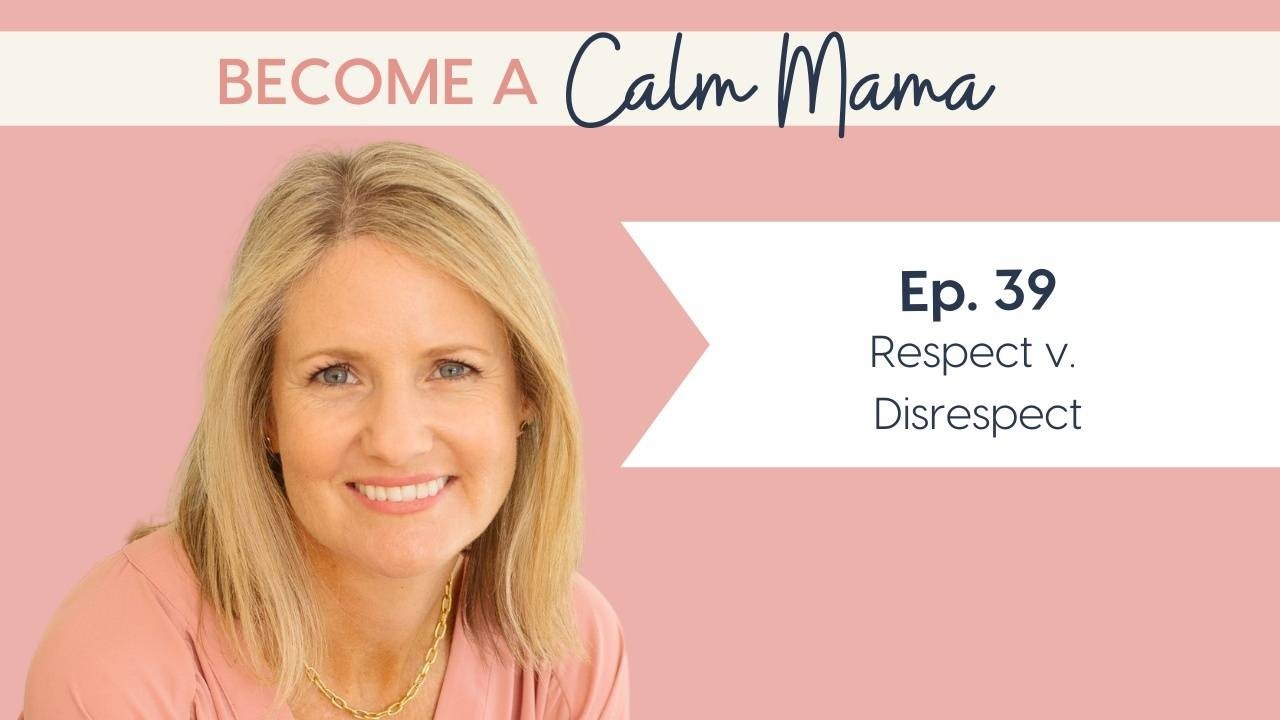
Respect v. Disrespect
Oct 26, 2022Follow the Show
Apple Podcasts | Google Podcasts | Spotify | Everywhere else
Parents often say to me that their child “is being disrespectful” or that “their behavior is disrespectful”. But is it? And if so, what can you do about it?
In this episode, you’ll learn how to tell the difference between respectful and disrespectful behavior, why not everything falls into one of those two categories and how to create mutual respect in your family.
What is mutual respect?
One of the concepts I teach in my program, The Calm Mama Club, is this idea of mutual respect.
This means that as a parent you are cultivating community within your family. This looks like: I care about you. I will help you. I am willing to be uncomfortable for your benefit. I'm willing to delay gratification so that you will be more comfortable or have your needs met. AND you are willing to do those things for me.
We all have different needs, desires and expectations, and we can come together and figure out how to meet everybody's needs. This won’t be perfect. You won’t make everyone happy every time. The important part is talking about it and considering if it could be possible and how to do it.
Between respect and disrespect
I share a few different definitions of respect in this episode. Essentially, it means that we are willing to pay attention to and have concern for another person. We look at what is in their body, mind and heart, and we are willing to see it all as important.
Parents often think that their child is disrespecting them because the child is not being considerate of their feelings, wishes, rights or traditions.
But having disrespect goes beyond just not considering. Disrespect is a way of thinking, an attitude of not caring about another person’s feelings, wishes and rights. It even goes so far as having ill regard for somebody else's feelings or desires.
I want to offer another perspective, one that lies somewhere between respect and disrespect. Something more neutral.
Non-regard or non-respect.
In non-respect, the child is in their own needs, feelings and wishes and they are simply not able to hold your feelings, wishes, thoughts and desires in mind.
It's not an active attempt to disregard what you want or need. It's just a non-regard. You're just not part of their thought process in that moment. And this is developmentally normal for kids.
How to cultivate mutual respect
Now of course you're going to want your kids to learn this concept of mutual respect. We want them to grow and be able to have high regard for us. To have respect for us. To consider our feelings and wishes and rights. We want them to be able to think about our time and our resources and consider the impact that their behavior or request might have on us.
We want to give our kids this ability to grow and to respect others. And we can do it in two ways.
Model self-respect
Your children will look to you to show them how you want to be treated. You can teach them what it means to be in a relationship with you.
That means you must think of yourself with high regard, consider your feelings and wishes and prioritize your own emotional wellbeing.
Limit setting is a great tool to hold your boundaries and show your child what respectful behavior looks like.
Show respect
This looks like being considerate of your child’s wishes and holding their feelings in high regard. It doesn’t mean that you need to give in to every wish.
It looks like recognizing and validating your child’s needs and emotions.
This is connection.
It's a lot easier for someone to give respect when they feel respected. They know how good it feels and are more willing to do that for other people. That's how you cultivate mutual respect in a family.
You’ll Learn:
- What disrespect really looks like (and what it doesn’t)
- Why showing respect is challenging for kids
- What you can do to encourage respectful relationships in your family
Connect With Darlynn:
- Sign up for love notes and learn about The Calm Mama Club at www.calmmamacoaching.com
- Follow me on Instagram @darlynnchildress for daily tips
- Rate and review the podcast on Amazon
The topic of self-respect is a really important one. Not knowing how to set boundaries, show ourselves respect and hold ourselves in high regard is a pervasive issue for women, and it leads to people-pleasing and not being able to say no.
Cultivating self-respect is the way out of people-pleasing and of burnout.
This November, join me for a new event - Opt Out of S*** and Stop People Pleasing So You Can Actually Enjoy the Holiday Season.
I will guide you through the process of opting out, how to set boundaries and say no to things and how to deal when other people get upset with you about it.
If you want the details, make sure you’re on my email list. Subscribe here.
Ready to stop yelling?
Get the one simple tool you need to stop yelling at your kids, so you finally feel calmer and connect better.
You'll learn why you yell, how to stop yourself yelling, 40 things to do instead and scripts for what to say to your kid when you yell.

